Today Current Affairs: 22nd July 2021 for UPSC IAS exams, State PSC exams, SSC CGL, State SSC, RRB, Railways, Banking Exam & IBPS, etc
Table of Contents
National Carbon Emissions Trading Market: China:
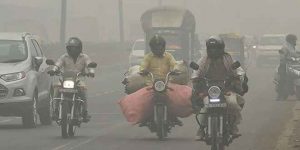
After running pilot projects at the local level for over a decade, China has officially launched its long-awaited national carbon emissions trading market.
- China’s Emissions Trading Scheme (ETS) has replaced the EU’s as the world’s largest emissions trading system.
Carbon market:
- A carbon market is where greenhouse gas emitters can buy and sell greenhouse gas emissions permits or allowances.
- Companies that over-performed and have surplus targets in hand will sell them in this market; those polluting will have to buy the surplus to submit their compliance statement.
- The government sets the cap on the total amount of carbon emissions for the year, then companies receive or buy emissions quotas within the cap.
- In the first phase, the system only covers the power sector. Over 2,000 power companies, emitting more than 4 billion tonnes of greenhouse gases per year or 40 percent of the country’s yearly total, have participated.
- Seven more high energy-intensive industries, including iron and steel and construction materials, will be covered by the carbon market in the future.
- The country is trying to use the trading scheme to reduce greenhouse gas emissions, as part of its effort to peak its emissions by 2030 and achieve carbon neutrality by 2060.
- Now, for the first time, the responsibility for controlling greenhouse gas emissions at the national level is left to the enterprises.
World’s Fastest Ground Vehicle:

China has unveiled a high-speed maglev train with a designed top speed of 600 kms per hour. It is stated to be the world’s fastest ground vehicle.
- The new maglev transportation system made its public debut in the coastal city of Qingdao, China’s east Shandong province.
- Launched in October 2016, the high-speed maglev train project saw the development of a magnetic-levitation train prototype with a designed top speed of 600 kms per hour in 2019, and conducted a successful test run in June 2020.
- The train fills the speed gap between aviation and high-speed trains.
- Compared with traditional vehicles running on wheels, high-speed maglev trains do not have contact with rail tracks.
- They have advantages in terms of efficiency and speed and produce very little noise.
WHO-GMP/COPP Certification For 18 Ayurvedic Products.:

The Indian Medicines Pharmaceutical Corporation Ltd. (IMPCL) (Central Public Sector Enterprise) Mohan, Dist. Almora, Uttarakhand under the administrative control of Ministry of AYUSH, Government of India has applied for “WHO-GMP/COPP certification for 18 Ayurvedic products.
- The WHO GMP certificate is mandatory in most global markets for pharmaceutical companies to be able to sell medicines.
- The manufacturer of an exporting country must be licensed by the regulatory authority of that country and comply with the WHO GMP guidelines
- The certificate of pharmaceutical product (CPP or CoPP) is a certificate issued in the format recommended by the World Health Organization (WHO).
Provisions Of 97th Amendment Struck Down: SC:
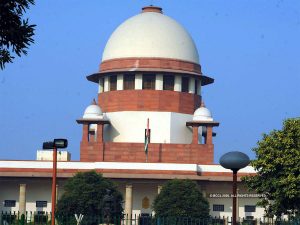
The Supreme Court (SC) upheld a 2013 judgment of the Gujarat High Court and struck down certain provisions of the Constitution (97th Amendment) Act, 2011.
- It gave a major boost for federalism as the 97th Amendment shrank the exclusive authority of States over its co-operative societies, a sector considered as a massive contributor to the economy.
- Part IXB, introduced into the Constitution through the 97th Amendment, dictated the terms for running co-operative societies.
- The provisions in the Amendment, passed by Parliament without getting them ratified by State legislatures as required by the Constitution.
- It went to the extent of determining the number of directors a society should have or their length of tenure and even the necessary expertise required to become a member of the society.
- The word “cooperatives” was added after “unions and associations” in Article 19(1)(c) under Part III of the Constitution. This enables all the citizens to form cooperatives by giving it the status of fundamental right of citizens.
- A new Article 43B was added in the Directive Principles of State Policy (Part IV) regarding the “promotion of cooperative societies”.
SC’s Ruling:
Exclusive Legislation of States:
- The constitution has been described as quasi-federal in that, so far as legislative powers are concerned, though there is a tilt in favour of the Centre vis-à-vis the States given the federal supremacy principle.
- Quasi-federalism means an intermediate form of state between a unitary state and a federation.
- Part IX B, which consists of Articles 243ZH to 243ZT, has “significantly and substantially impacted” State legislatures’ “exclusive legislative power” over its co-operative sector under Entry 32 of the State List.
- The court pointed out how Article 243ZI makes it clear that a State may only make law on the incorporation, regulation and winding up of a society subject to the provisions of Part IXB of the 97th Amendment.
Not Ratified by the States:
- It held that the 97th Constitutional Amendment required ratification by at least one-half of the state legislatures as per Article 368(2) of the Constitution, since it dealt with an entry which was an exclusive state subject (co-operative societies).
- Under Article 368(2), Parliament can amend the Constitution by passing a Bill with a special majority.
- Since such ratification was not done in the case of the 97th amendment, it was liable to be struck down.
- Upheld the Validity of Provisions related to Multi State Cooperative Societies:
- It did not strike down the portions of Part IXB of the Amendment concerning ‘Multi State Co-operative Societies (MSCS)’ due to the lack of ratification.
- When it comes to MSCS with objects not confined to one State, the legislative power would be that of the Union of India which is contained in Entry 44 List I (Union List).
- It is declared that Part IXB of the Constitution is operative only insofar as it concerns multi-State cooperative societies both within the various States and in the Union Territories.
India Inequality Report 2021: Oxfam:
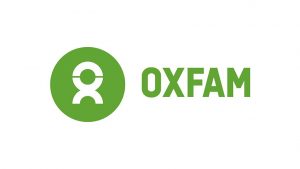
The report titled “India Inequality Report 2021: India’s Unequal Healthcare Story” released by Oxfam India shows that the socio-economic inequalities seep into the health sector and disproportionately affect health outcomes of marginalised communities due to the absence of Universal Health Coverage (UHC).
- The report suggested that the states which are attempting to reduce existing inequalities and with higher expenditure on health had lower confirmed cases of Covid-19.
- It provides a comprehensive analysis of the health outcomes across different socioeconomic groups to gauge the level of health inequality that persists in the country.
- The findings are primarily based on secondary analysis from rounds 3 and 4 of the National Family Health Survey and various rounds of the National Sample Survey.
Finding of the Report:
- The general category performs better than SCs and STs; Hindus perform better than Muslims; the rich perform better than the poor; men are better off than women; and the urban population is better off than the rural population on various health indicators.
- The states that have for the past few years been reducing inequalities, such as inequalities to access to health between the general category and SC and ST populations, have less confirmed cases of Covid – such as Telangana, Himachal Pradesh and Rajasthan.
- Kerala invested in infrastructure to create a multi-layered health system, designed to provide first-contact access for basic services at the community level and expanded primary healthcare coverage to achieve access to a range of preventive and curative services.
- Rural-Urban Divide:
- It was highlighted during the second wave of the Covid-19 pandemic, when rural areas witnessed a shortage of tests, oxygen and hospital beds.
- Doctor-person Ratio:
- The National Health Profile in 2017 recorded one government allopathic doctor for every 10,189 people and one state-run hospital for every 90,343 people.
- :Hospital Beds
- The investment in public health infrastructure is so little that the number of beds in the country has actually come down, from 9 beds per 10,000 persons in the 2010 Human Development Report, to only 5 beds per 10,000 persons today.
- India also ranks the lowest in the number of hospital beds per thousand population among the BRICS nations at 0.5. It is lower than lesser developed countries such as Bangladesh (0.87), Chile (2.11) and Mexico (0.98).
- Women Literacy:
- While women’s literacy has improved across social groups over the years, SC and ST women lag behind the general category by 18.6% and 27.9%, respectively.
- There exists a gap of 55.1% between the top and bottom 20% of the population in 2015-16.
- Though the female literacy rate among Muslims (64.3%) is lower than all religious groups, inequality has reduced over time.
- Sanitation:
- As far as sanitation is concerned, 65.7% households have access to improved, non-shared sanitation facilities in the general category while SC households are 28.5% behind them and ST are 39.8% behind them.
- While 93.4% of households in the top 20% have access to improved sanitation, only 6% have access in the bottom 20 % — a difference of 87.4%.
- Immunisation:
- The immunisation in ST households at 55.8% is still 6.2% below the national average, and Muslims have the lowest rate across all socio-religious groups at 55.4%.
- The rate of immunisation of girls continues to be below that of the male child.
- More than 50% of children still do not receive food supplements in the country.
- Life Expectancy:
- Life expectancy based on wealth is 65.1 years for the bottom 20% of the households, while it is 72.7 years for the top 20%.
- Antenatal Care:
- Percentage of mothers who have received full antenatal care declined from 37% in 2005-06 to 21% in 2015-16.
- The share of institutional deliveries in India has increased from 38.7% in 2005-06 to 78.9% in 2015-16.
- Infant Mortality Rate:
- Overall improvement in Infant mortality rate (IMR) is not equal across social groups. Dalits, Adivasis and OBCs have higher IMR as compared to the general category.
- IMR for Adivasis is 44.4 which is 40% more than the general category and 10% more than the national average.
Bihar’s Kishanganj Gets Digital Fertility Map:
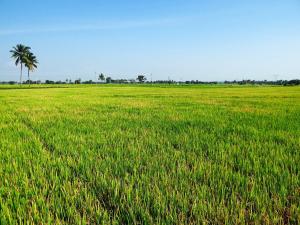
The digital fertility map has been prepared by the scientists of Bihar Agriculture University (BAU).
Benefits for farmers:
- They can now easily decide which crops they should grow in particular areas for better gains.
- They can introduce new crops, go for crop diversifications.
- They can also decide about the exact dose of fertilisers after knowing the fertility level of their soil.
- This will get them bumper crops.
- Agricultural experts and farmers are worried over the growing digitisation of land records and their fertility details.
- They apprehend the data could be exploited by private companies and big corporate houses for various purposes, such as land acquisition and predatory lending, leaving farmers in crisis.
Kapu Community Reservation:
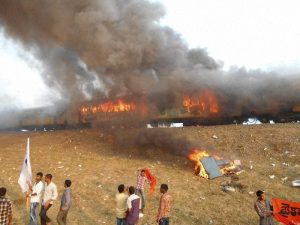
The Andhra Pradesh government has announced 10% reservation for the Kapu community and other Economically Weaker Sections (EWS) for appointments in the initial posts and services in the State government.
- This reservation is extended in accordance with the Constitution (103rd Amendment) Act, 2019.
- The Kapus are primarily an agrarian community based in the Andhra-Telangana region.
- It is believed that they migrated from the Gangetic plains, probably from Kampilya (near Ayodhya) thousands of years ago.
- They entered what is present-day Telangana and, after clearing the forests along the banks of the Godavari, settled down to farming.
- The Kapu community is demanding inclusion in the ‘Backward Castes’ category “like they were before independence”.
- The first major protest for the inclusion of the Kapus in the ‘Backward Castes’ was held in 1993.
- A government order was then issued for their inclusion in ‘Backward Castes’. However, it was not honoured.
Guidelines for EWS Reservation:
- Persons who are not covered under the existing scheme of reservations for SCs, STs and Socially and Educationally Backward Classes and whose gross annual family income is below Rs 8 lakh are to be identified as EWS for the benefit of reservation.
- The income includes income from all sources i.e. salary, agriculture, business, profession etc. for the financial year prior to the year of application.
- The term family for this purpose will include the person who seeks benefit of reservation, his or her parents and siblings below the age of 18 years as also his or her spouse and children below the age of 18 years.
New Shepard.:

Billionaire Jeff Bezos has made a short journey to space, in the first crewed flight of his rocket ship, New Shepard.
- New Shepard, built by Bezos’ company Blue Origin, is designed to serve the burgeoning market for space tourism.
- The spacecraft lifted off from a private launch site near Van Horn, Texas. The capsule reached a maximum altitude of around 107km before starting its descent, parachuting down to a soft landing in the West Texas desert 11 minutes later.
- Competing head to head with fellow billionaire Richard Branson, who flew into space aboard his Virgin Galactic rocketplane July 11, Bezos blasted off with his brother Mark and two history-making passengers: 82-year-old aviation pioneer Wally Funk, the oldest person to fly in space, and Oliver Daemen, an 18-year-old Dutch student who is the youngest ever to fly in space.
The Commission For Air Quality Management In The National Capital Region And Adjoining Areas Bill, 2021::
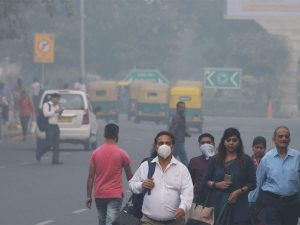
The bill will be introduced in the parliament by the Ministry of Environment, Forests and Climate Change (MoEF).
- The bill will establish the commission and replace an ordinance.
- The Bill has taken into consideration the concerns of the farmers following several rounds of negotiations, after they had raised concerns of stiff penalties and possible jail terms for stubble burning.
Changes made:
- The government has decriminalised the act of stubble burning and withdrawn the clause for possible jail time.
- However, environmental compensation fees are levied on those who are found to be engaged in stubble burning, including farmers.
About the Commission for Air Quality Management (CAQM):
- The Commission was first formed by an ordinance in October 2020.
- The erstwhile Environment Pollution (Prevention and Control) Authority, or EPCA had been dissolved to make way for the Commission.
- The Commission will be a statutory authority.
- The Commission will supersede bodies such as the central and state pollution control boards of Delhi, Punjab, Haryana, UP and Rajasthan.
- Composition:
- Chairperson: To be chaired by a government official of the rank of Secretary or Chief Secretary.
- The chairperson will hold the post for three years or until s/he attains the age of 70 years.
- It will have members from several Ministries as well as representatives from the stakeholder States.
- It will have experts from the Central Polluti
Monsoon Session Of Parliament::
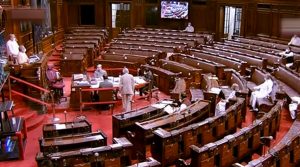
The monsoon session of Parliament has begun.
- The last session of Parliament was curtailed and ended sine die on March 25 and under the Constitutional norms, the next session has to be held within six months. This period ends on September 14.
- Article 85 requires that there should not be a gap of more than six months between two sessions of Parliament.
- The Constitution does not specify when or for how many days Parliament should meet.
- The maximum gap between two sessions of Parliament cannot be more than six months.
- That means the Parliament should meet at least twice a year.
- A ‘session’ of Parliament is the period between the first sitting of a House and its prorogation.




